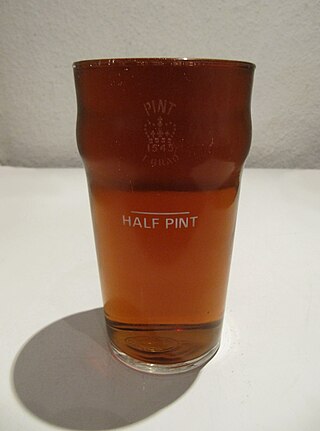
The pint is a unit of volume or capacity in both the imperial and United States customary measurement systems. In both of those systems it is traditionally one eighth of a gallon. The British imperial pint is about 20% larger than the American pint because the two systems are defined differently. Almost all other countries have standardized on the metric system, so although some of them still also have traditional units called pints, the volume varies by regional custom.

Polyethylene terephthalate (or poly(ethylene terephthalate), PET, PETE, or the obsolete PETP or PET-P), is the most common thermoplastic polymer resin of the polyester family and is used in fibres for clothing, containers for liquids and foods, and thermoforming for manufacturing, and in combination with glass fibre for engineering resins.

A wine bottle is a bottle, generally a glass bottle, that is used for holding wine. Some wines are fermented in the bottle while others are bottled only after fermentation. Recently the bottle has become a standard unit of volume to describe sales in the wine industry, measuring 750 millilitres. Wine bottles are produced, however, in a variety of volumes and shapes.

A drink can is a metal container designed to hold a fixed portion of liquid such as carbonated soft drinks, alcoholic drinks, fruit juices, teas, herbal teas, energy drinks, etc. Drink cans are made of aluminum or tin-plated steel. Worldwide production for all drink cans is approximately 370 billion cans per year.
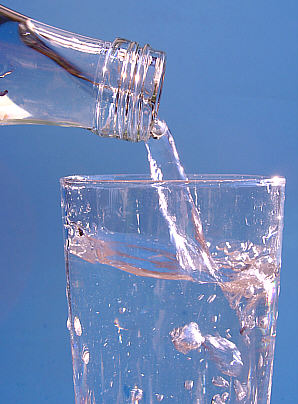
Bottled water is drinking water packaged in plastic or glass water bottles. Bottled water may be carbonated or not. Sizes range from small single serving bottles to large carboys for water coolers.
Dasani is an American based brand of bottled water created by the Coca-Cola Company, launched in 1999. It is one of many brands of Coca-Cola bottled water sold around the world. The product is filtered and bottled.
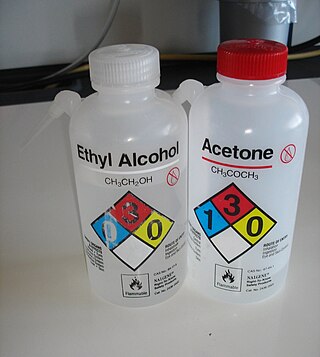
Nalgene is a brand of plastic products developed originally for laboratory use, including items such as jars, bottles, test tubes, and Petri dishes, that were shatterproof and lighter than glass. The properties of plastic products make them suitable for work with many substances in various temperature ranges.

Tang is an American drink mix brand that was formulated by General Foods Corporation food scientist William A. Mitchell and General Foods Corporation chemist William Bruce James in 1957, and first marketed in powdered form in 1959. The Tang brand is currently owned in most countries by Mondelēz International, a North American company spun off from Kraft Foods in 2012. Kraft Heinz owns the Tang brand in North America.

A beer bottle is a bottle designed as a container for beer. Such designs vary greatly in size and shape, but the glass commonly is brown or green to reduce spoilage from light, especially ultraviolet.

A keg is a small cask.

Container-deposit legislation is any law that requires the collection of a monetary deposit on beverage containers at the point of sale and/or the payment of refund value to the consumers. When the container is returned to an authorized redemption center, or retailer in some jurisdictions, the deposit is partly or fully refunded to the redeemer. It is a deposit-refund system.

Tropicana Brands is an American fruit-based beverage company. It was founded in 1947 by Anthony T. Rossi in Bradenton, Florida. Between 1998 and 2021 it was a subsidiary of PepsiCo. In August 2021, 61% of Tropicana was sold along with the rest of PepsiCo's juice brand portfolio for $3.3 billion to PAI Partners. PepsiCo retained the remaining 39% of the companies ownership.
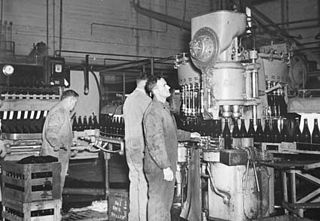
Beer arrived in Australia at the beginning of British colonisation. In 2004 Australia was ranked fourth internationally in per capita beer consumption, at around 110 litres per year; although, the nation ranked considerably lower in a World Health Organization report of alcohol consumption per capita of 12.2 litres. Lager is by far the most popular type of beer consumed in Australia.
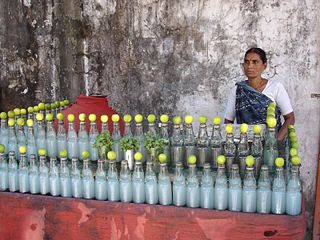
Banta Soda, or Banta, also Goli Soda or Goti Soda and Fotash Jawl, is a popular carbonated lemon or orange-flavoured soft drink sold in India since the late 19th century in a distinctly shaped iconic Codd-neck bottle. The pressure created by the carbonated liquid seals the bottle by forcing a glass marble up into the neck of the bottle where it snugly locks into a rubber gasket. Opening the bottle by pressing on the marble thus releasing the pressurised gas is seen to be a fun experience. The drink is easily available at street-sellers, known as bantawallahs, at prices ranging from ₹5 (6.3¢ US) – ₹30 (38¢ US). The drink is sold in glass tumblers and plastic cups, and used to be served in kulhars.
Alcohol measurements are units of measurement for determining amounts of beverage alcohol.
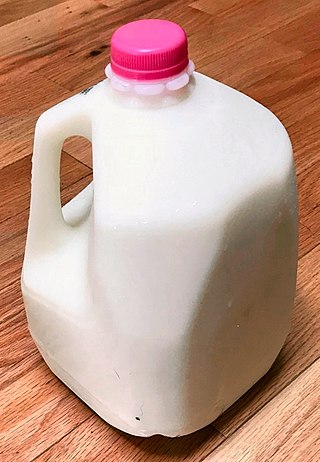
Plastic milk containers are plastic containers for storing, shipping and dispensing milk. Plastic bottles, sometimes called jugs, have largely replaced glass bottles for home consumption. Glass milk bottles have traditionally been reusable while light-weight plastic bottles are designed for single trips and plastic recycling.

Frooti is a mango-flavoured drink sold in India. It is made with natural flavours and mango-concentrate. It is the flagship product and most successful drink product made by Parle Agro. Frooti was launched in 1985 in Tetra Pak packaging, and is now also sold in PET bottles and rectangular shaped packs. Frooti is exported to the United States, Canada, the United Kingdom, the United Arab Emirates, Saudi Arabia, Malaysia, Maldives, Singapore, Thailand, New Zealand, Australia, Mozambique, Ghana, Malawi, Zambia, Nigeria, Tanzania, Japan, and Ireland.

A plastic bottle is a bottle constructed from high-density or low density plastic. Plastic bottles are typically used to store liquids such as water, soft drinks, motor oil, cooking oil, medicine, shampoo, milk, and ink. The size ranges from very small bottles to large carboys. Consumer blow molded containers often have integral handles or are shaped to facilitate grasping.
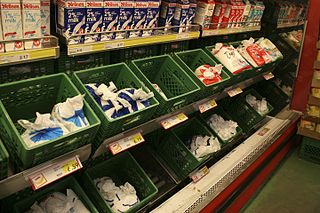
A milk bag is a plastic bag that contains milk. Usually one of the corners is cut off to allow for pouring, and the bag is stored in a pitcher or jug.
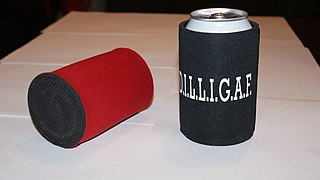
A koozie (US) or stubby holder (Australian) is a fabric or foam sleeve that is designed to thermally insulate a beverage container, like a can or bottle.

















